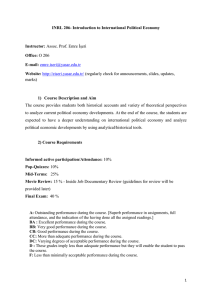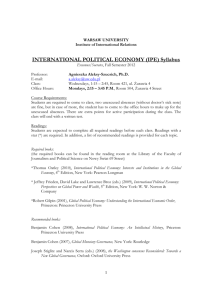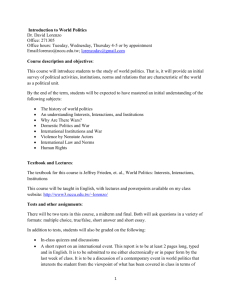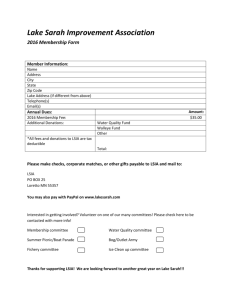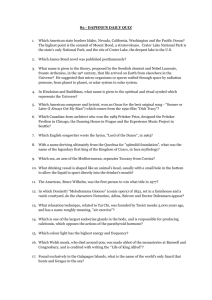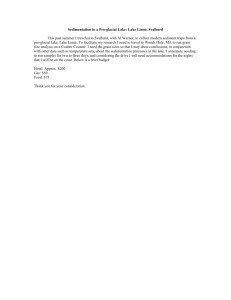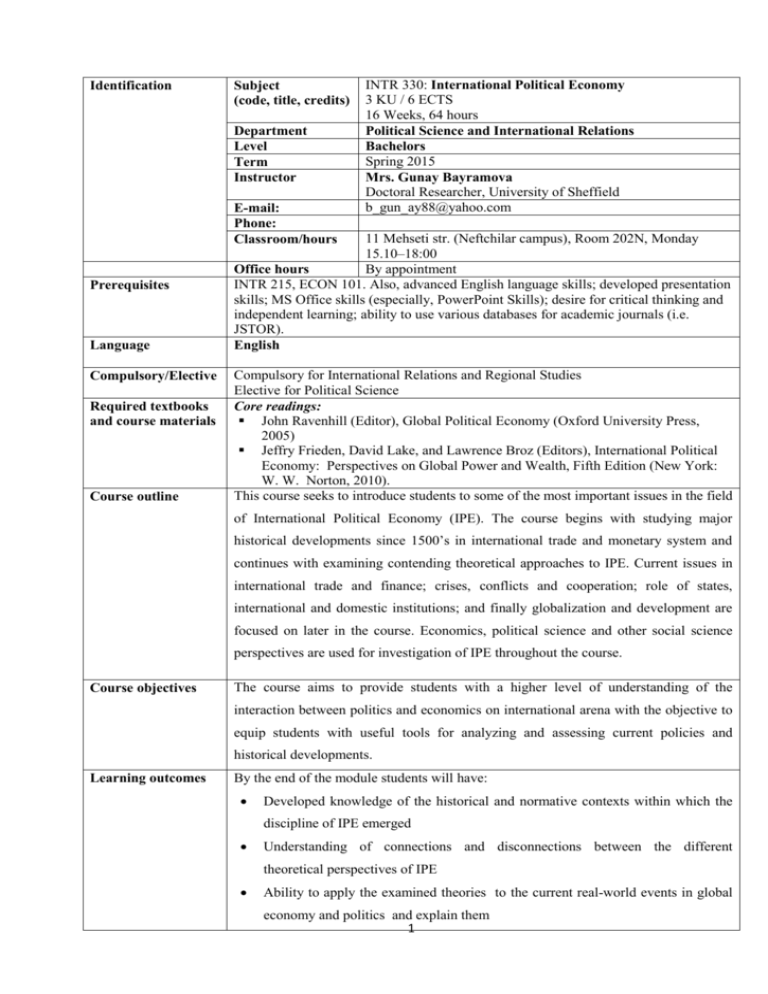
Identification
Subject
(code, title, credits)
Department
Level
Term
Instructor
E-mail:
Phone:
Classroom/hours
Prerequisites
Language
Compulsory/Elective
Required textbooks
and course materials
Course outline
INTR 330: International Political Economy
3 KU / 6 ECTS
16 Weeks, 64 hours
Political Science and International Relations
Bachelors
Spring 2015
Mrs. Gunay Bayramova
Doctoral Researcher, University of Sheffield
b_gun_ay88@yahoo.com
11 Mehseti str. (Neftchilar campus), Room 202N, Monday
15.10–18:00
By appointment
Office hours
INTR 215, ECON 101. Also, advanced English language skills; developed presentation
skills; MS Office skills (especially, PowerPoint Skills); desire for critical thinking and
independent learning; ability to use various databases for academic journals (i.e.
JSTOR).
English
Compulsory for International Relations and Regional Studies
Elective for Political Science
Core readings:
John Ravenhill (Editor), Global Political Economy (Oxford University Press,
2005)
Jeffry Frieden, David Lake, and Lawrence Broz (Editors), International Political
Economy: Perspectives on Global Power and Wealth, Fifth Edition (New York:
W. W. Norton, 2010).
This course seeks to introduce students to some of the most important issues in the field
of International Political Economy (IPE). The course begins with studying major
historical developments since 1500’s in international trade and monetary system and
continues with examining contending theoretical approaches to IPE. Current issues in
international trade and finance; crises, conflicts and cooperation; role of states,
international and domestic institutions; and finally globalization and development are
focused on later in the course. Economics, political science and other social science
perspectives are used for investigation of IPE throughout the course.
Course objectives
The course aims to provide students with a higher level of understanding of the
interaction between politics and economics on international arena with the objective to
equip students with useful tools for analyzing and assessing current policies and
historical developments.
Learning outcomes
By the end of the module students will have:
Developed knowledge of the historical and normative contexts within which the
discipline of IPE emerged
Understanding of connections and disconnections between the different
theoretical perspectives of IPE
Ability to apply the examined theories to the current real-world events in global
economy and politics and explain them
1
Deepened understanding of world trade and finance
Developed knowledge of globalization; its causes and effects
Demonstrate appropriate cognitive, communicative and transferable skills,
including working independently as well as part of a team; managing a varied
workload; assimilating and synthesizing multiple theoretical ideas; constructing
coherent, independent and critical arguments
Evaluation
Methods
Midterm evaluation
Class attendance
Active participation
Case-study in small
groups and PowerPoint
presentation
Final exam
Date/deadlines
To be determined by the
Dean’s Office
(Research topics will be
discussed with the students)
To be determined by the
Dean’s Office
Active participation at
the events organized by
the Department
Total
Percentage (%)
30
5
10
15
40
100
Policy
Teaching Methodology:
The course will be taught through a combination of lectures and discussions. Students
are
urged
to
read
the
course
materials
carefully
in
advance
as assigned on the reading list and come to classes ready for discussions.
Failure to do so will impede your ability to profit from the lectures, and to perform well
in section participation and on the examinations.
The seminars will be discussion-focused; therefore active participation in class
discussions is expected and will be a crucial determinant for student evaluation.
Class attendance:
Students are required to comply with the attendance policy of Khazar University. Fulltime students are expected to attend all classes unless they are sick or have the
permission of the instructor (approved absence).
A student must submit an absence request in anticipation of an absence from the
course. In case he/she fails to do so, his absence will be considered unapproved.
Specifically, to be eligible for taking exams, students must not miss more than 20% of
class hours (unapproved absences). Otherwise, the student can take the exam only with
the approval of the School Dean. Continuing unapproved absences or lack of
participation may lead to withdrawal from the course.
Withdrawal (pass/fail)
This course strictly follows grading policy of the School of Humanities and Social
Sciences. Thus, a student is normally expected to achieve a mark of at least 60% to
pass. In case of failure, he/she will be required to repeat the course in the following
term or year.
Academic misconduct
Academic honesty plays an essential part in maintaining the integrity of Khazar
University. Students are expected to recognize and uphold high standards of
intellectual and academic integrity. The following acts are examples of academic
dishonesty, therefore are strictly forbidden and will, if proven, be penalized:
2
-
plagiarism,
cheating,
unauthorized collaboration,
falsification,
multiple submissions.
On plagiarism: Plagiarism is copying other people's work without proper attribution.
The students committing plagiarism and the students providing materials for
plagiarizing will automatically receive a zero (0) for the assignment. Students must
always indicate that they used someone else's words and ideas if they have done so, by
using quotation marks and mentioning the source in the text or a footnote. A
bibliography must also follow after the end of your essays.
Rules of Professional Conduct
The students shall behave in the way to create favorable academic and professional
environment during the class hours. Unauthorized discussions and unethical behavior
are strictly prohibited. Classroom behavior that seriously interferes with either (a) the
instructor’s ability to conduct the class or (b) the ability of other students to benefit
from the course program will not be tolerated. When a student’s behavior in a class is
so seriously disruptive as to compel immediate action, the instructor has the authority
to remove a student from the class on an interim basis, pending an informal hearing on
the behavior.
Tentative Schedule
This syllabus is a guide for the course and any modifications to it will be announced in advance.
Topic
Week 1
29/01/2015
Introduction to
International Political
Economy
Week 2
02/02/2015
Indicative reading
John Ravenhill, pp. 3-28: Ravenhill, “The study of global
political economy”, pp. 3-28
Frieden, Lake, Broz, pp. 1‐19:
Frieden, Lake, Broz, “Introduction: International Politics and
International Economics,” pp. 1‐19
John Ravenhill, pp. 87-151:
Gilbert R. Winham, “The evolution of the global trade regime”
World Trade in Historical
Perspective
Week 3
9/02/2015
Evolution of the
International Monetary
System
Frieden, Lake, Broz, pp. 83-118:
Frieden, Lake, Broz, “Historical Perspectives,” pp. 83‐86.
Cheryl Schonhardt‐Bailey, “Free Trade: The Repeal of the Cor
n Laws,” pp. 87‐97
Peter Gourevitch, ʺInternational Trade, Domestic Coalitions, an
d Liberty: Comparative Responses to the Crisis of 1873‐1896,ʺ
pp. 98‐118
John Ravenhill, pp. 151-175:
Eric Helleiner, “The Evolution of the International Monetary
and Financial System”, pp. 151-175
Frieden, Lake, Broz, pp. 246-272:
Barry Eichengreen, ʺHegemonic Stability Theories of the
International Monetary System,ʺ pp. 246‐272”
3
Week 4
16/02/2015
Perspectives on the IPE
Week 5
23/02/2015
Collaboration and
coordination in the
International Political
Economy
Week 6
02/03/2015
Domestic Sources of
International Political
Economy
Week 7
09/03/2015
International Trade
Week 8
16/03/2015
International Trade
Week 9
Week 12
06/04/2015
Frieden, Lake, Broz, pp. 53-62:
Stanley Engerman and Kenneth Sokoloff, “History Lessons: In
stitutions, Factor Endowments, and Paths of Development in th
e New World,” pp. 53‐62
John Ravenhill, pp. 50-86:
Michael J. Hiscox, “The Domestic Sources of Foreign
Economic Policies”, pp. 50-86
Frieden, Lake, Broz, pp. 223-245:
Lawrence Broz, “The Domestic Politics of International Monet
ary Order: The Gold Standard,” pp. 223‐245
Frieden, Lake, Broz, pp. 337-375:
Frieden and Lake, “Trade,” pp. 337‐340
Cletus C. Coughlin, ʺThe Controversy over Free Trade: The ga
p between Economists and the General Public,ʺ pp. 341‐364
Ron Rogowski, ʺCommerce and Coalitions: How Trade Affects
Domestic Political Alignments,ʺ pp. 365‐375
Frieden, Lake, Broz, pp. 376-392; 422-442:
James E. Alt and Michael Gilligan, ʺThe Political Economy of
Trading States: Factor Specificity, Collective Action Problems,
and Domestic Political Institutions,ʺ pp. 376‐392
Michael Bailey, Judith Goldstein, and Barry Weingast, “The In
stitutional Roots of American Trade Policy,” pp. 422‐442
Midterm evaluation
Week 10
23/03/2015
Week 11
30/03/2015
Frieden, Lake, Broz, pp. 21-81:
Frieden, Lake, Broz, “Contending Perspectives,” p. 21
Stephen Krasner, ʺState Power and the Structure of Internationa
l Trade,ʺ pp. 23‐41
Barry Eichengreen, ʺThe Political Economy of the Smoot‐Hawl
ey Tariff,ʺ pp. 42‐52
John Ravenhill, pp. 87-115:
Vinod K. Aggarwal and Cedric Dupont, “ Collaboration and
coordination in the GLobal Political Economy”, pp. 87-115
International Finance
Frieden, Lake, Broz, pp. 217‐221, 273‐285, 297‐313:
Frieden and Lake: “Money and Finance,” pp. 217‐221
Benjamin J. Cohen, ʺThe Triad and the Unholy Trinity: Proble
ms of International Monetary Cooperation,ʺ pp. 273‐285
Matthew Gabel, “Divided Opinion, Common Currency: The
Political Economy of Public Support for EMU,” pp. 297‐313
International Financial
Crises
John Ravenhill, pp. 176-206:
Louis W. Pauly, “The Political Economy of International
Financial Crises”, pp. 176-206
Regionalism
John Ravenhill, pp. 116-150:
John Ravenhill, “Regionalism”, pp. 116-150
4
Week 13
13/04/2015
Globalization
Week 14
20/04/2015
Globalization and
Development
Week 15
27/04/2015
Current Problems in IPE
John Ravenhill, pp. 207-290
Anthony McGrew, “The Logics of Globalization”, pp. 207-234
Colin Hay, “Globalization’s Impact on States”, pp. 235-262
Alan M. Rugman, “Globalization and Regional International
Production”, pp. 263- 290
Frieden, Lake, Broz, pp. 63-81; 200-215
Jeffrey Frankel, “Globalization of the Economy,” pp. 63‐81
Dan Drezner, “Globalization and Policy Convergence,” pp. 200
‐215
John Ravenhill, pp. 291-343
Robert Hunter Wade, “Globalization, Poverty and Inequality”,
pp. 291-316
Caroline Thomas, “Globalization and Development in the
South”, pp. 317-343
Frieden, Lake, Broz, pp. 314-336; 447-467; 474-485:
Schmukler, Sergio L., “Financial Globalization: Gain and Pain
for Developing Countries,” pp. 314‐336
David Dollar, ʺGlobalization, Poverty, and Inequality since 198
0,ʺ pp. 447‐467
Jeffry A. Williamson, “Globalization and Inequality, Past and P
resent,” pp. 474‐485
Frieden, Lake, Broz, pp. 505‐581:
Frieden and Lake, “Current Problems in International Political
Economy,” pp. 505‐506
Jeffrey Frankel, ʺThe Environment and Globalization,ʺ
pp. 507‐535
Kenneth Scheve and Matthew Slaughter, “A New Deal for Glo
balization,” pp. 536‐545
Dani Rodrik, “How to Save Globalization From its Cheerleader
s,” pp. 546‐566
Simon Johnson, ʺThe Quiet Coup,ʺ pp. 567‐581
Week 16
Conclusion
04/05/2015
To be
announced by Final Exam
the Dean’s
Office
Additional reading:
Thomas Oatley, International Political Economy: Interests and Institutions in the Global Economy, Fifth
Edition (New York: Pearson Longman, 2012).
Graham Bannock, R.E. Baxter, and Evan Davis, The Penguin Dictionary of Economics, Eighth edition (N
ew York: Penguin, 2011).
Randy Charles Epping, A Beginner’s Guide to the World Economy, Third Edition (New York: Vintage, 2
001).
5
Mark Blyth, The Routledge Handbook of International Political Economy (New York: Routledge, 2009)
Robert Gilpin, Global Political Economy (Princeton: Princeton University Press, 2001)
Nicola Phillips (ed.), Globalizing International Political Economy, (Houndmills: Palgrave, 2005)
Matthew Watson, Foundations of International Political Economy, (Houndmills: Palgrave, 2005)
If neccesary, some modifications may be made to this syllabus by the instructor.
6

